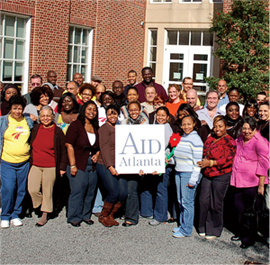HOME
PAST DIGITAL ISSUES
HIV/AIDS HOTLINES
HIV 101
POSITIVE PROFILES
ASO SPOTLIGHT
RECENT ARTICLES
HOW TO PAY FOR HIV TREATMENT AND MEDICATIONS
ADAP CRITERIA AND FORMULARIES
ASO LISTINGS
REVIEW OF HIV MEDICATIONS
2018 HIV/AIDS FUNDRAISING ACTIVITIES & EVENTS
ABOUT HIV POSITIVE! MAGAZINE
LINKS
SUBSCRIBE
CONTACT US
ADVERTISER INFORMATION

Editor's Note: If you are newly diagnosed with HIV, one of the most important things you can do is visit your nearest ASO (AIDS Service Organization).
What is an ASO? Although each one defines its mission a little differently, what they all have in common is that they help people with HIV connect with the information and resources they need. Depending on where you live, you may find they can hook you up with everything from primary health care and medications to housing, drug or alcohol abuse treatment, transportation, psychological counseling and legal representation. They have answers to questions you don't even know to ask. And they know of benefits you may be entitled to that you've never even heard of.
Because they play such an important role in the HIV healthcare system, we regularly spotlight really exceptional ASOs around the country. If you feel your ASO should be featured here, send me an email at LPorter@PHPubs.com, and let me know why!
AID Atlanta was founded in 1982 as a grassroots response to what was happening in Atlanta at the time.
“Initially, this was a very small organization,” said Executive Director Tracy Elliott. “It operated a hotline, and it did information distribution. But it grew. Thanks to a generous grant from the Robert Wood Johnson Foundation, AID Atlanta pioneered the case management treatment model that is now used by ASOs all across the country. Today, AID Atlanta is the largest comprehensive AIDS Service Organization in the Southeastern United States, with 100 employees – more than 80% of whom provide direct client services, or prevention/testing services.”
AID Atlanta offers an array of services to people living with HIV or AIDS. It operates a clinic that provides primary health care to 500 people a year, all of them at less than 300% of the federal poverty level. It provides testing and counseling services to 6,000 people a year. It provides case management to 4,000 people a year. It has a housing program that provides rental assistance to people who are marginally housed. And it provides access to a wide variety of other services through referrals to other organizations.
AID Atlanta also has an extremely active outreach program, targeting primarily African American men who have sex with men (MSM), Caucasian MSM, African American women, Latinos/Latinas, and youth.
“One of our key challenges for the future is to effectively educate young people who are sexually active on the risks of unprotected sex,” said Tracy. “Through an alliance with the Rotary Club of Georgia, we reach 20,000 kids in junior high schools every year with our prevention message.”
Like most other ASOs, AID Atlanta has been hurt by the current economic recession.
“The economy has marginalized so many people economically, it puts more people at risk for HIV - for a variety of reasons,” Tracy said. “The economic situation has made the financial challenges facing our current clients much more devastating as well. At the same time, funding has become a greater challenge than ever before. Individuals’ ability to give has been curtailed by the economy, and governments are also cutting back. As our needs have increased, our funding has decreased. This puts everyone in the not-for-profit human services world in a pinch.”
Tracy Elliott’s advice to someone newly diagnosed with HIV? “Don’t panic and don’t despair,” Tracy said. “With good medical care, HIV can be managed. It requires a strong commitment to your personal health and well-being, and support. If you don’t have insurance or the resources to pay for your own care, connect with an ASO like AID Atlanta. Get with a case manager to assess what can be done. That’s what our case managers do – assess your needs, and determine how those needs can be most effectively met.”
More information about AID Atlanta is available on-line at AID Atlanta.
Copyright 2018, Positive Health Publications, Inc.
This magazine is intended to enhance your relationship with your doctor - not replace it! Medical treatments and products should always be discussed with a licensed physician who has experience treating HIV and AIDS!